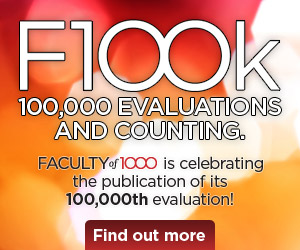F100K
| 7 January, 2011 | Richard P. Grant |
|

|
It’s going to be a good year.
 Back at the beginning of December I tipped you off that we were approaching a quite amazing statistic, the publication of our 100,000th evaluation. I’m now happy to let you know that #100,000 went live on Tuesday this week: High CO2 enhances the competitive strength of seaweeds over corals, evaluated by Professor Mark Hay of our Ecology Faculty. Read all about it in our press release, and view the evaluation for free at https://bit.ly/F100K.
Back at the beginning of December I tipped you off that we were approaching a quite amazing statistic, the publication of our 100,000th evaluation. I’m now happy to let you know that #100,000 went live on Tuesday this week: High CO2 enhances the competitive strength of seaweeds over corals, evaluated by Professor Mark Hay of our Ecology Faculty. Read all about it in our press release, and view the evaluation for free at https://bit.ly/F100K.
The article evaluated comes from Guillermo Diaz-Pulido and colleagues in Brisbane, and was published online in Ecology Letters on 14 December (10.1111/j.1461-0248.2010.01565.x). Professor Hay chose this paper because of its importance to understanding the changes human activity has wrought upon ocean ecosystems. He says that the study
demonstrated that ocean acidification not only made it harder for corals to calcify, but also enhanced the ability of seaweed competitors to kill corals, causing further, rapid loss of reef corals in complex ways that go far beyond the first-order, obvious effects on coral physiology.
I called Professor Hay, and recorded this short video, in which he talks about his own work, the Diaz-Pulido paper and his predictions for developments in ecology:
[pullquote]”Much of my own work I can summarize by saying I figure out how things get lunch without becoming lunch”[/pullquote]
Despite the rather bleak note at the end, Professor Hay is hopeful that we will be able to use the output of ecology research to intervene and prevent disaster, just as medical research leads to life-saving therapies on a more personal level.
We all at F1000 and The Scientist would like to thank all our authors and Faculty Members for contributing towards making F1000 a success, and we look forward to seeing much more ground-breaking research evaluated over the next year. Onwards and, as they say, upwards.
PS Congratulations are also due to 28 and a PhD, who wins an F1000 sweatshirt for guessing the closest publication date.

|
